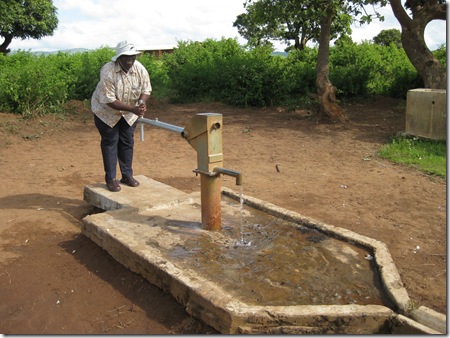That’s my contention for today. Malawi doesn’t have a water problem. It has a hydrogeologist problem.
Yesterday I was reading a report about water access in one of Malawi’s lakeside districts. The district has a major hydreogeological split – close to the lake it has a shallow water table, further from the lake it has a deeper water table. This means that close to the lake you can use hand-drilled boreholes and shallow wells, while further from the lake you need to drill boreholes with a rig.
The report examined a GPS survey of waterpoints in the district, and found that despite the shallow aquifer close to the lake, many organizations were still using drilling rigs to drill boreholes, each at over twice the cost of hand-drilled boreholes, and over six times the cost of hand-dug shallow wells. Talk about an inefficient use of money.
 A mechanically drilled borehole in use.
A mechanically drilled borehole in use.
An extrapolation found that if appropriate technologies were used for each section of the water table, than the cost of bringing water access in the district up to government standards could be halved – a savings of over four hundred thousand dollars.
But, of course, it’s not going to happen that way. Using rigs to drill boreholes is the norm in the water sector here – efficient resource allocation based on underlying hydrogeology is not.
In my opinion, a big part of the reason is the dearth of educated professionals in the country – especially in technical sectors. Go to an NGO or government office focusing on water access (other than the national ministry), and you will find few, if any, engineers, hydrologists, or hydrogeologists. Same thing for the private sector – the last guy I met doing borehole siting was an accountant. Without these educated professionals, endogenous discource on hydreogeological-based efficiency of technology choice is unlikely to emerge. Without this discource, better decisions will not emerge either.
It’s all about where investment goes. Malawi graduates very few engineers and hydreogeologists per year. Meanwhile, massive investment goes into water infrastructure, but that investment is used quite inefficiently, in part because of an underlying lack of technically qualified professionals to manage it. I think that if 30% of the money invested in water infrastructure went to technical education instead, the decision wouldn’t be amiss. But of course it won’t happen.
Why won’t it happen? Now I’m entering into the realm of conjecture, but I believe it’s because of a massive bias development partners have towards funding “basic needs”. A program drilling wells is easy to sell. A program providing university scholarships for hydrogeology…less so. It’s the Millenium Villages approach to development – provide basic needs and development will spring from the grassroots. Personally I think it ignores the significant necessary investment in creating an educated and empowered class of local professionals who are required to make that “basic needs” investment efficient and sustainable. What do you think?

